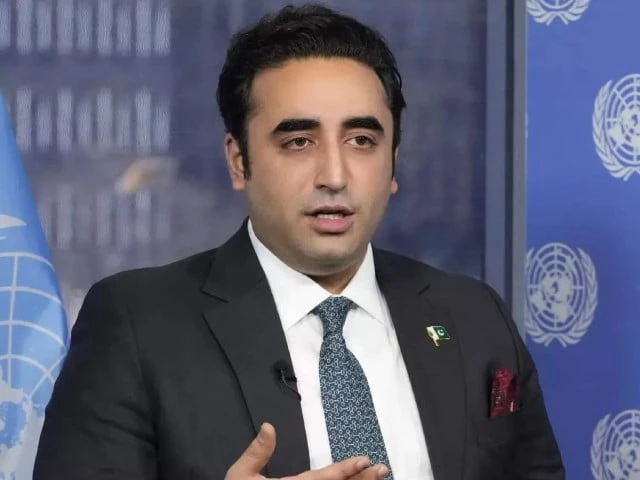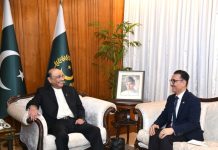——– Says Pakistan is open to talks on terrorism, but Kashmir must be central to any meaningful dialogue
——– Points towards India’s clandestine activities
——– Asserts India continues aggressive attitude even after setback in recent standoff
——– Avers regions needs peace, not war for prosperity
From Zeeshan Mirza
KARACHI: Heading the Parliamentary Diplomatic Committee, Pakistan Peoples Party (PPP) Chairman and former foreign minister Bilawal Bhutto Zardari has called on US President Donald Trump to play a role in defus-ing tensions between Pakistan and India.
In an interview with AFP, Bilawal urged US President Donald Trump to play an active role in bringing India to the negotiating table for comprehensive talks with Pakistan. He stated that while Pakistan is open to discussions on terrorism, the central issue of any meaningful dialogue must be the Kashmir conflict.
He highlighted the growing dangers posed by India, which used terrorism as a justification for military action, potentially destabilising the entire South Asian region. “The destiny of 1.7 billion people cannot be left to faceless non-state actors or India’s so-called new normal,” he warned. In a separate interview with Chinese media, Bilawal called out India for deliberately undermining re-gional peace through unilateral aggression on Pakistani soil. He stressed that the Pakistani community in the US must unite and contribute to shared goals of peace and prosperity.
He reaffirmed Pakistan’s commitment to peace and dialogue, emphasising the country’s role as a re-sponsible actor amid rising tensions.
The former FM appealed to the international community to support efforts for peace, noting that last-ing stability in South Asia hinges on inclusive dialogue. A peaceful South Asia, with normalised trade relations between India and Pakistan, would bring widespread benefits to the region and beyond, he added.
Bilawal further acknowledged the sacrifices made by Pakistan’s military leadership in the ongoing fight against terrorism. “We have consistently taken steps toward peace, while India continues its aggres-sion,” he said. “If India escalates the situation, Pakistan retains the right to respond accordingly.”
He also addressed the issue of Indian-sponsored terrorism in Balochistan, supporting terrorist groups like the Balochistan Liberation Army (BLA) and th Tehreek-e-Taliban Pakistan (TTP). He questioned whether this would lead to an ongoing cycle of conflict after every terrorist attack, given India’s ap-proach.
Meanwhile, Bilawal held meetings with key figures, including Senator Tom Cotton, Congress members Liu Correa and Brian Mast, and senior officials from the US Department of Homeland Security. These discussions focused on regional cooperation, the Kashmir dispute, and the broader implications for US-Pakistan relations.
During a talk at the Middle East Institute in Washington, he underscored the urgent need for the reso-lution of long-standing conflicts in the region. He reiterated Pakistan’s willingness to engage in discus-sions on Kashmir, terrorism, and water issues, but emphasized the need for the US to act as a media-tor to advance the dialogue.
He pointed out that India’s actions in Kashmir have violated international agreements and UN resolu-tions. He commended the recent US efforts in offering to mediate, which has re-internationalised the Kashmir issue, disproving India’s narrative that Kashmir is a bilateral matter.
He further stressed that Pakistan condemns terrorism and firmly rejects any involvement in recent incidents in Kashmir, calling for impartial international investigations, which India has so far rejected.
Bilawal also raised concerns over India’s threat to disrupt Pakistan’s water supply under the Indus Wa-ter Treaty, describing this as a potential trigger for war. He urged the US and the international commu-nity to intervene and prevent this dangerous trend, warning of its catastrophic consequences for the entire region.
Reflecting on the recent conflict with India, he highlighted Pakistan’s military victories, including the shooting down of Indian aircraft. He noted that, at the diplomatic level, the world has once again rec-ognised the importance of Pakistan-India relations.
He expressed hope for future cooperation between India and Pakistan, particularly in the areas of trade, water security, and environmental challenges like flooding and drought.
He also proposed the possibility of an India-Pakistan Economic Corridor, which could enhance bilateral prosperity while benefiting regional and global stakeholders, particularly the US.
Bilawal concluded the mission with a strong call for international support in ensuring lasting peace and stability in South Asia, stressing that both Pakistan and India must prioritise dialogue and cooperation to address shared challenges and secure a prosperous future for the region.
Other members of the parliamentary delegation thanked the US for its positive response and reaf-firmed Pakistan’s commitment to peaceful resolutions of all unresolved issues. They also urged global leaders to support this critical diplomatic mission.




